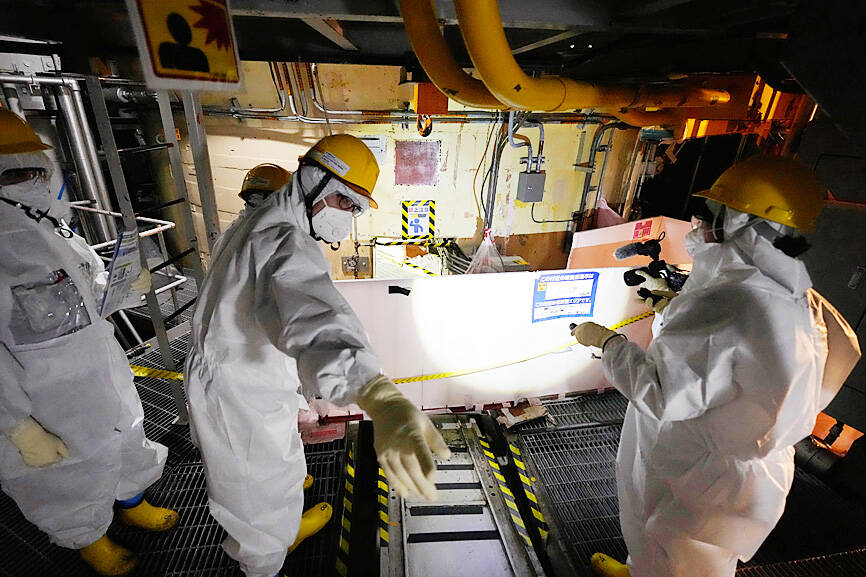Japanese engineers yesterday began a difficult operation to remove a second sample of radioactive debris from inside the stricken Fukushima Dai-ichi nuclear power plant.
About 880 tonnes of hazardous material are inside the site after a catastrophic tsunami caused by a magnitude 9.0 earthquake triggered one of history’s worst nuclear accidents in 2011.
Removing the debris is seen as the most daunting challenge in a decades-long decommissioning project because of the dangerously high radiation levels.

Photo: AP
“At 10:03am, the second trial extraction operation was started,” operator Tokyo Electric Power Co (TEPCO) said in a statement.
The second removal comes after TEPCO completed the first trial removal operation using a specially developed extendible device in November last year.
The sample weighing just below 0.7g — equivalent to about one raisin — was delivered to a research laboratory near Tokyo for analysis, but TEPCO needs more data to examine methods for full-scale debris extractions.
The company in December last year said that it was “upgrading” the telescopic device used for the first experiment by attaching a new camera to its tip.
Three of Fukushima Dai-ichi’s six reactors went into meltdown in 2011 after the huge tsunami swamped the facility.
Robots last month began moving sandbags that were used to absorb radiation-contaminated water on underground floors of two buildings at the site.
Japan in 2023 began releasing into the Pacific Ocean some of the 540 Olympic swimming pools of treated wastewater, which has been endorsed by the International Atomic Energy Agency.
China banned Japanese seafood imports as a result, and Russia later followed suit.
China earlier this month said that it found no abnormalities in seawater and marine life samples that it independently collected near the nuclear power plant in February, but Beijing indicated that more tests would be needed before it lifts the ban.

INVESTIGATION: The case is the latest instance of a DPP figure being implicated in an espionage network accused of allegedly leaking information to Chinese intelligence Democratic Progressive Party (DPP) member Ho Jen-chieh (何仁傑) was detained and held incommunicado yesterday on suspicion of spying for China during his tenure as assistant to then-minister of foreign affairs Joseph Wu (吳釗燮). The Taipei District Prosecutors’ Office said Ho was implicated during its investigation into alleged spying activities by former Presidential Office consultant Wu Shang-yu (吳尚雨). Prosecutors said there is reason to believe Ho breached the National Security Act (國家安全法) by leaking classified Ministry of Foreign Affairs information to Chinese intelligence. Following interrogation, prosecutors petitioned the Taipei District Court to detain Ho, citing concerns over potential collusion or tampering of evidence. The

NEGOTIATIONS: Taiwan has good relations with Washington and the outlook for the negotiations looks promising, Minister of Economic Affairs J.W. Kuo said Taiwan’s GDP growth this year is expected to decrease by 0.43 to 1.61 percentage points due to the effects of US tariffs, National Development Council (NDC) Minister Paul Liu (劉鏡清) said at a meeting of the legislature’s Economics Committee in Taipei yesterday, citing a preliminary estimate by a private research institution. Taiwan’s economy would be significantly affected by the 32 percent “reciprocal” tariffs slapped by the US, which took effect yesterday, Liu said, adding that GDP growth could fall below 3 percent and potentially even dip below 2 percent to 1.53 percent this year. The council has commissioned another institution

NEGOTIATIONS: The US response to the countermeasures and plans Taiwan presented has been positive, including boosting procurement and investment, the president said Taiwan is included in the first group for trade negotiations with the US, President William Lai (賴清德) said yesterday, as he seeks to shield Taiwanese exporters from a 32 percent tariff. In Washington, US Trade Representative Jamieson Greer said in an interview on Fox News on Thursday that he would speak to his Taiwanese and Israeli counterparts yesterday about tariffs after holding a long discussion with the Vietnamese earlier. US President Donald Trump on Wednesday postponed punishing levies on multiple trade partners, including Taiwan, for three months after trillions of US dollars were wiped off global markets. He has maintained a 10 percent

TRADE: The premier pledged safeguards on ‘Made in Taiwan’ labeling, anti-dumping measures and stricter export controls to strengthen its position in trade talks Products labeled “made in Taiwan” must be genuinely made in Taiwan, Premier Cho Jung-tai (卓榮泰) said yesterday, vowing to enforce strict safeguards against “origin laundering” and initiate anti-dumping investigations to prevent China dumping its products in Taiwan. Cho made the remarks in a discussion session with representatives from industries in Kaohsiung. In response to the US government’s recent announcement of “reciprocal” tariffs on its trading partners, President William Lai (賴清德) and Cho last week began a series of consultations with industry leaders nationwide to gather feedback and address concerns. Taiwanese and US officials held a videoconference on Friday evening to discuss the